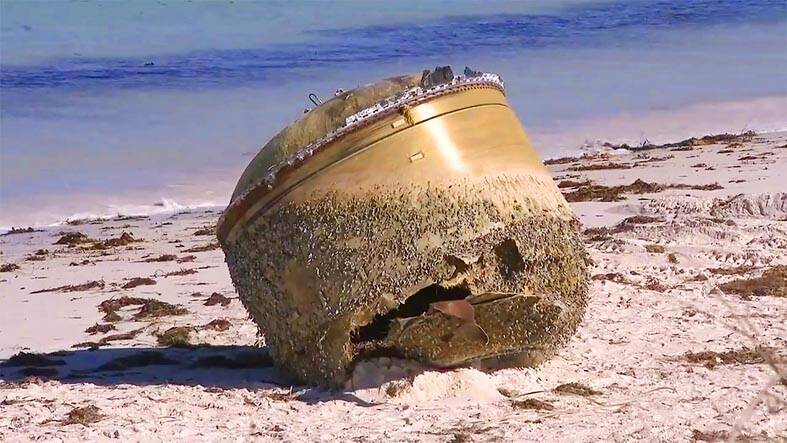Authorities yesterday were investigating whether a cylindrical object about the size of a small car that washed up on a remote Australian beach is space junk from a foreign rocket.
Police had cordoned off the object after it was discovered at Green Head, about 250km north of the city of Perth, late on Sunday.
The Australian Space Agency said it was liaising with other space agencies to identify the object, which appears to be partly made of a woven material.

Photo: Channel 9 via AP
“The object could be from a foreign space launch vehicle and we are liaising with global counterparts who may be able to provide more information,” the agency wrote on Twitter.
European Space Agency engineer Andrea Boyd said her colleagues believe the item that washed up from the Indian Ocean fell from an Indian rocket while launching a satellite.
“We’re pretty sure, based on the shape and the size, it is an upper-stage engine from an Indian rocket that’s used for a lot of different missions,” she told Australian Broadcasting Corp.
Whoever launched the object into space would be responsible for its disposal.
“There is a United Nations Office for Outer Space Affairs, and they have an outer space treaty that everyone has signed saying that whoever launches something into space is responsible for it right until the very end,” Boyd said.
Western Australia Police in a statement on Monday said that a government chemical analysis had determined the object was safe and “there is no current risk to the community.”
Authorities had earlier treated the device as hazardous and urged the public to stay away.
Police said the device would be removed following formal identification of its origin.
“Police will maintain security of the object until it is removed and members of the public are requested to stay away from the location,” the statement said.

ELECTION DISTRACTION? When attention shifted away from the fight against the militants to politics, losses and setbacks in the battlefield increased, an analyst said Recent clashes in Somalia’s semi-autonomous Jubaland region are alarming experts, exposing cracks in the country’s federal system and creating an opening for militant group al-Shabaab to gain ground. Following years of conflict, Somalia is a loose federation of five semi-autonomous member states — Puntland, Jubaland, Galmudug, Hirshabelle and South West — that maintain often fractious relations with the central government in the capital, Mogadishu. However, ahead of elections next year, Somalia has sought to assert control over its member states, which security analysts said has created gaps for al-Shabaab infiltration. Last week, two Somalian soldiers were killed in clashes between pro-government forces and

Ten cheetah cubs held in captivity since birth and destined for international wildlife trade markets have been rescued in Somaliland, a breakaway region of Somalia. They were all in stable condition despite all of them having been undernourished and limping due to being tied in captivity for months, said Laurie Marker, founder of the Cheetah Conservation Fund, which is caring for the cubs. One eight-month-old cub was unable to walk after been tied up for six months, while a five-month-old was “very malnourished [a bag of bones], with sores all over her body and full of botfly maggots which are under the

BRUSHED OFF: An ambassador to Australia previously said that Beijing does not see a reason to apologize for its naval exercises and military maneuvers in international areas China set off alarm bells in New Zealand when it dispatched powerful warships on unprecedented missions in the South Pacific without explanation, military documents showed. Beijing has spent years expanding its reach in the southern Pacific Ocean, courting island nations with new hospitals, freshly paved roads and generous offers of climate aid. However, these diplomatic efforts have increasingly been accompanied by more overt displays of military power. Three Chinese warships sailed the Tasman Sea between Australia and New Zealand in February, the first time such a task group had been sighted in those waters. “We have never seen vessels with this capability

‘NO INTEGRITY’: The chief judge expressed concern over how the sentence would be perceived given that military detention is believed to be easier than civilian prison A military court yesterday sentenced a New Zealand soldier to two years’ detention for attempting to spy for a foreign power. The soldier, whose name has been suppressed, admitted to attempted espionage, accessing a computer system for a dishonest purpose and knowingly possessing an objectionable publication. He was ordered into military detention at Burnham Military Camp near Christchurch and would be dismissed from the New Zealand Defence Force at the end of his sentence. His admission and its acceptance by the court marked the first spying conviction in New Zealand’s history. The soldier would be paid at half his previous rate until his dismissal